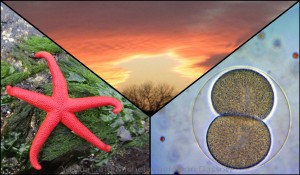Dr. Mickey von Dassow is a biologist who studies how biomechanics affects development-environment interactions. He received his PhD in Integrative Biology at UC Berkeley, studying how fluid flow affects colonial marine animals. As a postdoc (U. of Pittsburgh), he studied the mechanics of tissue movements that shape amphibian embryos. Currently he is a guest research scientist at the Duke Marine Lab, and works primarily on sea urchin embryos.

Can everyone do scientific research? I hope to convince you the answer is “yes.” I’m trying to develop an online platform (http://IGoR.wikidot.com) to help amateur scientists and other science enthusiasts do their own scientific research, while at the same time helping experienced scientists tap into the skills and creativity of a broader community. I hope you’ll love the idea and want to help me spark IGoR to life*.
Currently, the vast majority of scientific research is done by professionals supported by big institutions, such as universities, government labs, or corporations. It’s difficult for even a trained and experienced scientist to find the resources and time to do research without this backing. There are pockets of science where amateurs frequently make substantial contributions (e.g. amateur astronomy and taxonomy). However, it wasn’t that long ago that the majority of science was done by people – such as Darwin and Wallace – who were outside academia. In fact, the great intellectual revolutions that created modern science were not started by trained scientists: there were no trained scientists at the time!
What makes it hard for people to do science outside of academia or government/corporate labs today? Some big hurdles include lack of familiarity with the vast scientific literature, lack of specific skills or equipment, and lack of time. Consider what skills you would need to equip a lab without a research budget. Electronics or programming? Glass working, metal working, or machining? Most PhDs don’t have all (if any) of those skills, or the tools to make use of them. However, lots of hobbyists have some of those skills and tools. Or consider what journals you would need access to. You may not have $40 to spend on a single paper that may or may not address your questions. But others may have access to a university subscription already, or may know that area of the literature enough to help you understand the paper.
If we could bring people’s skills, knowledge, and creativity together, we could overcome these barriers. Today, most people have access to huge amounts of scientific information on the internet, and carry in their pockets technologies unavailable to the best labs a few decades ago. There are also plenty of interesting scientific questions that can be addressed with little beyond our own senses and minds. Many people have expertise in gardening, photography, microscopy, mathematics — or any number of other areas — that could be used to address research questions. Some people may have the ability to build equipment, or the knowledge of local habitats to find good field sites. Still other people may have the scientific training to help design good studies, or analyze and interpret the resulting data. Such groups could include anyone from a science enthusiast with no training, to highly skilled PhD scientists, many of whom do not go on into research careers.
Anyone (not just professional scientists) can propose a research question on the IGoR website by starting a wiki-style “project” page. Then, other interested people can join in to share ideas, skills, or time to develop a research plan and address the question. In addition, a growing number of professional scientists have agreed to help answer users’ questions about research projects.
By working together and pooling talent and ideas, people with little scientific experience could learn how to carry out their own research. For example, do you want to decipher what scallops see with their bright-blue eyes? Do you wonder how mushrooms take shape? Or are you curious about how the plants in your garden behave?
The same approach provides a new way for experienced scientists to find people with diverse skills who could contribute to their research in different ways. Not only could researchers crowd-source problem solving, but by doing so they could have a broader impact on society and public understanding of science.
Please visit the IGoR wiki and see what you think. The most important things IGoR needs to succeed are to have people start or join discussions, post ideas for projects, and participate in or provide feedback on existing projects.
*Yes, it was Frankenstein’s monster that was sparked to life. But IGoR is shorter and provides a convenient backronym: Independent Generation of Research. Anyway, I doubt Dr. Frankenstein complied with EH&S standards, so Igor would